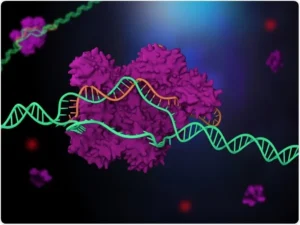The healthcare industry is undergoing a major transformation thanks to the rise of mRNA technology. Once considered a niche area of research, mRNA vaccines are now a vital part of the fight against the COVID-19 pandemic. But this is just the beginning. Scientists believe that mRNA could change the way we treat cancer, infectious diseases, and even genetic disorders. Unlike conventional vaccines that use weakened viruses, mRNA instructs our cells to synthesize proteins that enable the immune system to function. Because the technology is fast, precise, and flexible, it can be used to create customized vaccines and medicines faster. The mRNA revolution is changing the rules of bioengineering.
What is mRNA? How does it work?
Messenger RNA (mRNA) is a molecule that carries genetic information from DNA to the body’s protein-making machinery. Synthetic mRNA is designed to mimic the structure of viral proteins, teaching the immune system how to recognize and fight real infections. Once mRNA enters cells, it instructs them to synthesize harmless fragments of the target virus. After the immune system finds these proteins, it defends against them and stores them for use when new threats emerge. mRNA is a safe and temporary guide because it does not alter DNA. This elegant approach allows scientists to make rapid progress because they only need the genetic code of a pathogen, not the pathogen itself.
mRNA Vaccines are a Major Step Forward
The coronavirus pandemic has really put mRNA vaccines to the test, and they have worked. The Pfizer-BioNTech and Moderna vaccines were produced at record speed and are more than 90% effective. Their success shows that mRNA can be safely produced, stored, and used in humans in large quantities. In addition to the coronavirus pandemic, scientists are currently working on mRNA vaccines for influenza, HIV, rabies, and even malaria. Because the technology is so adaptable, it can be quickly adapted to combat new viruses. This makes it a powerful weapon against future pandemics. Once just an idea, mRNA has become a game-changer in medicine.
The Potential of mRNA in Medicine
Vaccines are the best-known application of mRNA, but its applications go much further. Cancer scientists are developing personalized mRNA therapies to trigger the immune system to attack tumors. Delivering the right mRNA instructions to malfunctioning cells could help treat rare genetic diseases like cystic fibrosis. Some studies are even looking at mRNA as a potential form of regenerative medicine, helping to repair heart tissue damaged by a heart attack. Being able to “program” cells with mRNA opens up a wide range of treatment possibilities, from fighting long-term infections to slowing the aging process. As science advances, mRNA could become an essential part of 21st-century health.
Issues and Ethical Questions to Consider
Despite its potential, mRNA technology does face some challenges. Extremely cold temperatures are required for storage and transportation, making it difficult to distribute vaccines in poor countries. Despite the large number of clinical trials that have been conducted, some people are still hesitant because they have heard incorrect information about the safety of the vaccine. The high cost of producing mRNA also raises concerns about its global availability. There are also ethical questions, such as whether mRNA can be used for bioterrorism and whether it should be patented. Addressing these issues is crucial to ensuring that mRNA benefits everyone, not just rich countries. The future of this cutting-edge technology depends on responsible innovation and widespread education.
The Future of mRNA Biotechnology
mRNA has the potential to transform healthcare in unimaginable ways over the next decade. Scientists are developing mRNA vaccines that don’t need to be frozen, allowing them to be stored for long periods of time. Combination vaccines could protect against multiple diseases at once, simplifying vaccination schedules. Artificial intelligence and machine learning could speed up mRNA design, allowing scientists to find the best pattern in minutes. In addition to treating infectious diseases, mRNA could also help treat autoimmune diseases, allergies, and neurodegenerative disorders. Biotech companies are investing billions of dollars in mRNA, suggesting that it is not just a way to stop pandemics but the future of healthcare.
Conclusion
The mRNA revolution is changing medicine, making treatments faster, better, and more precise than ever before. It could be used to stop the COVID-19 pandemic and possibly even cure cancer. It is versatile and transformative. While questions remain, research and new ideas are making it accessible to more people. As researchers begin to understand what mRNA really does, we are entering a new era of biotechnology. An era where diseases are stopped before they spread and personalized treatments become the norm. The next phase of the mRNA story looks set to be even more exciting than the last.
FAQs
1. Can mRNA vaccines be used?
Yes, mRNA vaccines have been thoroughly tested and proven safe in millions of people worldwide. They do not alter DNA and, after giving instructions to cells, break down on their own.
2. How long does mRNA stay in the body?
mRNA only stays in cells for a few days, long enough to instruct them to make proteins. After that, it is broken down by the body’s normal processes.
3. Do mRNA vaccines cause COVID-19?
No, mRNA vaccines do not deliver the virus intact; they simply provide the genetic instructions to make the spike protein, a safe part of the virus.
4. What other diseases can mRNA vaccines treat?
People are exploring the use of mRNA to treat influenza, HIV, Zika, rabies, and even cancer immunotherapy (a treatment that trains the immune system to attack tumors).
5. Will mRNA technology replace conventional vaccines?
Not quite—traditional vaccines are still useful, but mRNA is faster and more flexible, making it well-suited for rapidly mutating viruses and specialty drugs.




